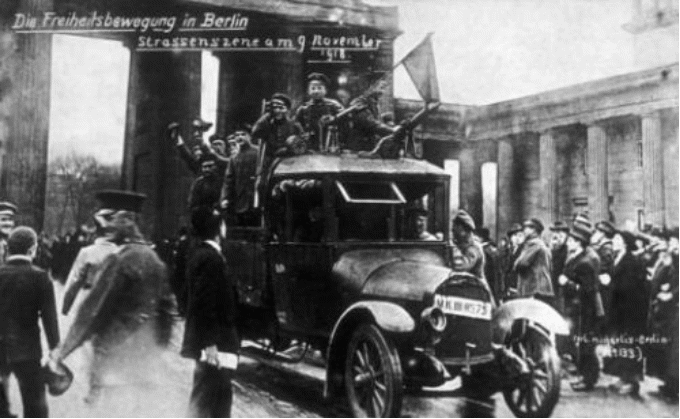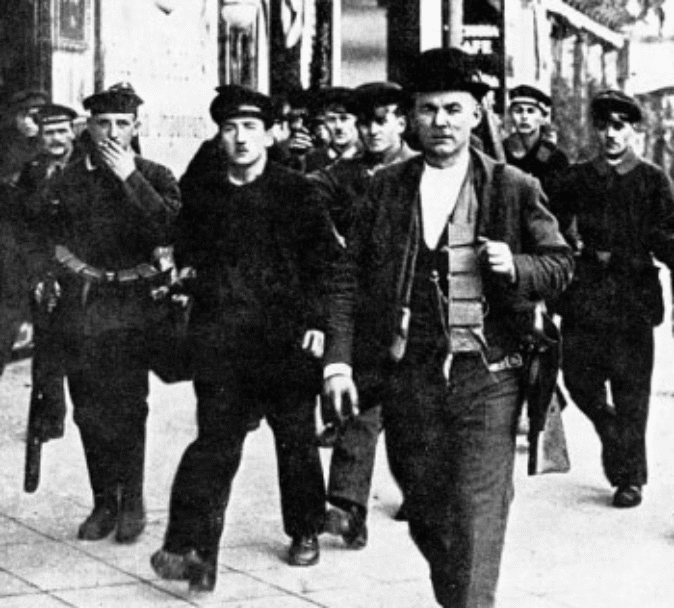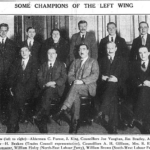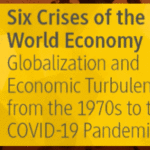 The German Revolution of 1917-1919, Part 5: Dual power
The German Revolution of 1917-1919, Part 5: Dual powerBy Greg Oxley
In this multi-part article, Greg Oxley looks in depth at the revolutionary period of 1917-1919 in Germany, and draws out some of the key lessons for the workers’ movement today. Part 4 looked at the revolutionary actions of the sailors, soldiers and workers in 1918 and the desperate attempts of the German establishment to save their system from being overthrown. Part 5 looks at the period of ‘dual power’ that followed the revolutionary events of 9 November 1918 and the questions that posed for the way forward.
**************
As events rapidly unfolded on 9 November 1918, the leaders of the USPD, still undecided about whether to join the government or not, promised to give an answer before 6pm. Initially, Ledebour’s categorical opposition to participation seemed to meet with majority support, but the gradual arrival of delegations of soldiers changed the mood of the conference. The soldiers – largely under the influence of the SPD leaders – insisted on the unity of “all socialists” and, due to political inexperience, saw in the differences in the programme and strategy nothing more than personal rivalries and divisions that were harmful to the cause of revolution.
Other delegations, composed largely of workers, tended to be in favour of government participation, notably on the part of Liebknecht, and saw this as a means to ensure that the government would move in the direction of socialism. Liebknecht arrived in the afternoon and saw that Ledebour’s categorical rejection would not be understood by the revolutionary masses at this stage, since they wanted the union of the entire “socialist” camp.
Libeknecht puts forward six conditions for participation in government
Thus, Liebknecht accepted the principle of participation, but only if six basic conditions were met: the proclamation of a Socialist Republic; the appointment of elected representatives of the workers and soldiers to all key positions in the administration; no participation of the bourgeois parties; participation of the USPD only until conclusion of an armistice; control of the “technical” ministries by representatives of the workers; and equal representation for each party in the cabinet. Ledebour alone voted against any participation, even under the conditions presented by Liebknecht.

9 November 1918
[The SPD only accepted the last two of Liebknecht’s conditions. The nature of the regime, it said, could only be decided by a new parliament, resulting from a Constituent Assembly. The current government was only provisional and would only sit until the establishment of the Constituent Assembly. Above all, there was no question of the SPD handing over power to a single class, and the participation of bourgeois parties was therefore essential.
In the absence of Haase, the USPD gave itself until the next day to determine its position on the SPD response. But the events of November 9 were not over yet. At 10pm, several hundred delegates from the insurgent workers met in the Reichstag Hall. Considering themselves to be a provisional Council of Workers and Soldiers in the capital, they decided to organise a new general assembly for the following morning (November 10th) on the basis of one delegate for every 1,000 workers. The assembly was to convene at 10am. It set itself the task of setting up a new revolutionary government. This completely cut across the schemes of Ebert, who had by now been appointed as Imperial Chancellor by Prince Max of Baden, despite the fact that the empire no longer existed!
The monarchy was clearly now finished
In the evening, Prince Max of Baden went to see Ebert before leaving the capital. Ebert seemed nervous, in a panic. He begged the prince not to leave, offering to ensure reliable administration of the Hohenzollern monarchy. The prince, astonished, refused the proposal. The monarchy was lost, and nothing could now save it. “Herr Ebert,” said the prince, according to his own account of the meeting, “I entrust you with the safeguarding of the German Empire.” Ebert replied: “I have lost two sons to this empire.”
Later that evening, Ebert received a telephone call in the chancellor’s private office. The ringing came from a telephone strictly reserved for exchanges between the Imperial Chancellor and the Supreme Military Command. It was General Groener. Ebert asked the general about the intentions of the Supreme Command. Groener replied that the Kaiser was sleeping in a carriage on the imperial train, on his way to Holland. He also told him that the Kaiser had asked Hindenburg to take over the command of the army and that the latter intended to bring the army back to Berlin as soon as the armistice was signed. Groener assured Ebert that there was no question of deposing the government, whose legitimacy Field Marshal Hindenburg recognised. Similarly, Hindenburg would adopt a friendly attitude towards the soldiers’ councils formed during the revolution.
When Groener stopped speaking, a long silence settled in. Then Ebert asked him: “And what do you expect from us?” Groener replied: “The command expects the government to help it maintain strict discipline within the army and to prevent the disruption of the railways.” Ebert: “Is there anything else?” Groener: “The command expects the imperial government to fight against Bolshevism, and for this purpose the army will place itself at the disposal of the government.” Ebert, relieved and moved, asked the general to “convey the government’s thanks to the Marshal.”
Pressure by the SPD for the radical forces to comply
In preparation for the delegate conference at the Busch Circus on the morning of 10 November, SPD deputy Otto Wels, who had been appointed to the Berlin garrison by Ebert, had printed at least 40,000 copies of a leaflet addressed to the soldiers. Wels’ main slogan was “No fratricidal struggle!”, in other words, no disunity in the “socialist” camp. The aim of this slogan was to put pressure on the USPD and the Spartacists to enter the government, or else be considered as dividers and saboteurs of the revolution.
At the USPD executive meeting, Haase, after some hesitation, spoke out in favour of participation, despite the rejection of the conditions presented by the USPD. Liebknecht was not present at this meeting but, informed of its deliberations, made it known that he would not participate in the government if the USPD renounced the conditions presented to the SPD. In the afternoon, the USPD and SPD finally reached an agreement. The cabinet was to be composed of three “people’s commissars” from each of the two parties. The agreement specified that the government’s policy would be decided by the cabinet, but also stipulated that “political power will be in the hands of the workers’, soldiers’ and sailors’ councils and that the convening of a Constituent Assembly would be discussed at some later date.”
The conference brought together between 1,500 and 2,000 delegates. Ebert spoke, recognising that the conditions imposed by the Entente were very harsh, but that Germany had no choice but to accept them, so that the carnage of the war could stop. He announced the agreement reached between the SPD and the USPD for the formation of a government “without bourgeois ministers”.
Liebknecht warns about the trap being prepared for the workers
Then Haase spoke, followed by Liebknecht. Knowing that the vast majority of soldiers were loyal to the SPD, Liebknecht spoke in a calm but incisive tone. Regularly interrupted, insulted and even threatened by the barracks delegates, he warned the delegates against the trap of unity: “These people who are today with the revolution and who were, until the day before yesterday, its declared enemies, collaborated with the military authorities during the war.”
Today, said Liebknecht, they want to turn the soldiers against the workers, to weaken the revolution, before strangling it: “The counter-revolution is already on the march. It has gone into action. She is right here, among us! His voice is often drowned out by the shouts of soldiers, brandishing their weapons: “Unity, unity, unity!” The conference approved the composition of the government as outlined in the SPD-USPD agreement.
After a confused and heated “discussion”, the election of the Executive Committee of the Workers’ and Soldiers’ Council convened. The committee was to be composed of 12 representatives of soldiers close to the SPD alongside 12 workers’ representatives, including 6 for the SPD and 6 for the USPD. The final declaration of the conference had a revolutionary tone. It affirmed that Germany was henceforth a Socialist Republic, declared for an immediate peace, and sent fraternal greetings to the revolutionary government in Russia.
A position of ‘dual power’ existed

10 Nov 1918
The overturn of 9-10 November meant that the fall of the monarchy led to a situation of dual power. On the one hand, there was the government, now called the Council of People’s Commissars, supported by the Council of Workers’ and Soldiers’ Delegates, which was to control the government as direct representatives of the people. On the other hand, despite the departure of the Kaiser, the military apparatus and the organs of administration of the old regime were still intact.
The capitalist class retained its immense economic power, even if it now had to tolerate the existence of a government brought to power by a mass revolutionary movement, at least for the time being. A dual power cannot last indefinitely. Either the organs of the revolution will dismantle the old state apparatus, so that a new revolutionary state, of which they are an embryonic form, can replace it, or else the old regime will destroy the revolutionary threat and become the undisputed master of society again.
The revolution in Germany led to a situation in which the leadership of the workers’ and soldiers’ councils was, like that of the government, in the hands of elements who sought, consciously or unconsciously, to contain the revolution. This development was an echo of the first phase of the Russian revolution, in which the soviets were mostly under the influence of reformists who wanted to limit the scope of the revolution and who later tried to destroy it completely.
The reformism of the masses is different to that of the leaders
Here, an important distinction must be made between the reformism of the masses and that of the leaders like Ebert, Scheidemann, and Noske. The workers and soldiers who placed their trust in the social democratic leaders did so through lack of experience, through a naïve underestimation of the dangers, and a misunderstanding of the real class relations that lay behind the words and actions of those who seemed, in their minds, to “understand politics”.
An oppressed class does not come easily to fully revolutionary ideas. It’s consciousness, including that of its most active and politically advanced layers, necessarily lags behind events. Lacking theoretical education, with little or no understanding of historical experience, it struggles to interpret the significance of events. The masses can learn rapidly under the impact of great events, but often belatedly and partially. It is here that the role of a revolutionary party, if it exists in a sufficiently developed and powerful form, can possibly make the difference between victory and defeat, as the Bolsheviks did in 1917.
The reformism of leaders like Ebert, Scheidemann, and Noske is of a completely different nature. It is not a result of misunderstandings about how to take the revolution to a victorious conclusion, but of a fully conscious adherence to the cause of the opposing class. They were conscious agents of the established order and of the counter-revolution. They pretended to accompany the revolution, only for as long as they were not able to crush it.
Searching for honest leaders in the early stages of a revolution
The situation that allowed treacherous leaders to find themselves in charge at the end of the November 1918 revolution reflects a feature of the first phase of any profound revolutionary movement, that is to say, one that awakens and mobilises an immense mass of previously passive and politically inert people. Learning by trial and error, the masses tend to place their trust, at first, in “knowledgeable” people who speak well and give an impression of competence. The masses rise up against the old order, but do not yet understand the need to destroy it, or how that can be done.
Politicians who, unlike Luxemburg and Liebknecht, are linked to the established order while vaguely positioning themselves as “opponents”, get a mass hearing from those who hope for “change”. A former party leader has more appeal than a former political prisoner. The confused and deceitful discourse of these politicians finds a basis in the ill-defined political conceptions of masses freshly propelled into the arena of great events. Liebknecht and Luxemburg understood their minority position as a consequence of the fact that the revolution was in its infancy.
The further development of the revolution would confirm, they thought, the correctness of their ideas. Lenin and Trotsky were of the same opinion at the time. They all understood, also, that the outcome of this revolution would decide not only the fate of Germany, but also that of Russia and perhaps of Europe.
Early concessions by the Ebert government to head off more revolt
The armistice with the Entente was signed on November 11, 1918. The new government took advantage of the diplomatic discussions to reassure the European powers and the United States that it would put down any attempt at further revolutionary upheaval. Ebert knew that it would be impossible to contain the masses if the government did not adopt “revolutionary” language and if it did not give tangible signs of wanting to satisfy at least some of the demands of the workers. Thus, he quickly abolished martial law. It no longer existed in practice, anyway, given the revolt within the armed forces.
He also restored freedom of association and assembly. Once again, these freedoms had already been taken by force. He declared an amnesty for political crimes and announced the convocation of a Constituent Assembly. The capitalists granted the eight-hour working day and trade union recognition.
The ruling class knows how to make concessions when it risks losing everything, but always with the hope of taking them back as soon as the balance of forces turns in its favour. The crucial question in this balance of power is the armed forces at the disposal of the protagonists. Karl von Clausewitz’s aphorism, according to which war is only the continuation of politics by other means, also applies in the field of the class struggle. The outcome of the German revolution, like that of all revolutions before and after it, would ultimately be determined by the ability of one or the other component of the “dual power” to overcome and disarm the opposing forces.
A surge in the number of soldiers’ and workers’ councils
The authority of the imperial command in the army was disintegrating. Trucks ran through the streets of Berlin and the other major cities, full of soldiers left to fend for themselves, waving red flags and brandishing weapons. Soldiers’ Councils were formed everywhere, not only in the cities, but even in the units coming back from the battlefields. The soldiers barracked in the cities, and therefore in daily contact with the workers, were more radicalised than those who were still on the front. Often, in industrial centres, soldiers joined forces with workers to take charge of local administration.
In Cologne, for example, they jointly directed security, food supply, housing management, the press, health infrastructure and transport, communications (post, telegraphy), the police, banks and the army headquarters. Cities under the control of workers and soldiers did not always recognise the authority of Ebert’s government. The councils of Dresden, Leipzig and Chemnitz met to declare that they are taking power into their own hands “to abolish capitalist exploitation”. In Bavaria, the revolutionary government acted in complete independence of the Berlin authorities, to the point of negotiating in its own name with the powers of the Entente in relation to the armistice.
Part 6 will look at how the government colluded with the Army to suppress the revolution and what led the revolutionary leaders to establish the communist party (KPD).
 What fascism meant then…and now - By Mark Langabeer, Hastings and Rye Labour Member During the 1930s, Leon Trotsky wrote about the rise of fascism in Germany and other European countries.
What fascism meant then…and now - By Mark Langabeer, Hastings and Rye Labour Member During the 1930s, Leon Trotsky wrote about the rise of fascism in Germany and other European countries. AHE 2024: value, profit and output - By Michael Roberts This blog was originally published by Michael Roberts on Saturday, 13 July 2024. The original article can be found here. ************** The
AHE 2024: value, profit and output - By Michael Roberts This blog was originally published by Michael Roberts on Saturday, 13 July 2024. The original article can be found here. ************** The Fifty years ago today: The Portuguese Revolution begins - By Greg Oxley Today is the fiftieth anniversary of the start of the revolution in Portugal, a process that unfolded over many months. Greg Oxley,
Fifty years ago today: The Portuguese Revolution begins - By Greg Oxley Today is the fiftieth anniversary of the start of the revolution in Portugal, a process that unfolded over many months. Greg Oxley, The Left and the Labour Party: Lessons from the 1920s – Part Two - Andy Ford (Warrington South Labour Member) completes his article on the relationship between the Communist Party and the Labour Party in the 1920s. Part two
The Left and the Labour Party: Lessons from the 1920s – Part Two - Andy Ford (Warrington South Labour Member) completes his article on the relationship between the Communist Party and the Labour Party in the 1920s. Part two Six crises of capitalism - By Michael Roberts José Tapia has a new book on the world economy. Tapia is a professor of politics at Drexel University, Philadelphia, where he
Six crises of capitalism - By Michael Roberts José Tapia has a new book on the world economy. Tapia is a professor of politics at Drexel University, Philadelphia, where he

